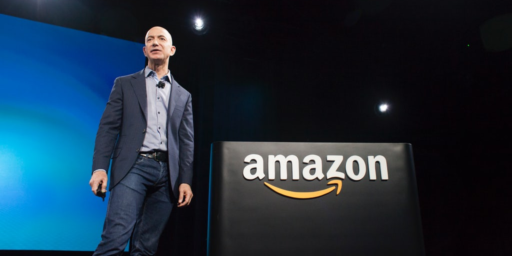Amazon Exploring Idea Of Book Rental Service
 Granted I don’t have the business acumen of Jeff Bezos, but this strikes me as an odd idea:
Granted I don’t have the business acumen of Jeff Bezos, but this strikes me as an odd idea:
Amazon is considering a Netflix-like service that would let people pay an annual fee to get book “rentals,” according to a published report.
The Wall Street Journal on Monday said the company has reached out to publishers but that it’s unclear whether the idea has much chance of catching on.
Quoting “people familiar with the matter,” the Journal said some publishers worry that such a service would cut down on the number of people buying books and hurt their relationships with other distributors.
According to the sources, Amazon has told publishers that it’s creating a digital library of older books. It would be available to customers of Amazon Prime, the company’s premium membership service that offers fast shipping of movies and TV shows.
A theoretically unlimited library of books otherwise sitting on dusty shelves somewhere is an interesting idea, but will people really be willing to pay for it? Isn’t that what libraries are for?






I wonder if platform migration is impacting “sales” of eBooks.
Remember, this is an area where a sale is less a sale and more a use-licensee to begin with.
Is anyone here “buying” books from their kindle and viewing them on their iPad or vis versa? How does that work right now?
When you buy (no scare quotes) a dead tree book, you own it for a century or more.
You seem to have a pretty significant misconception here, Doug. This proposed service is for ebooks, not dusty, physical books languishing on a shelf somewhere. And public libraries, mostly through no fault of their own, don’t offer much in the way of ebook rentals, but even that is growing.
So to me, this idea seems like a good one, since it’s growing a market. The major obstacle, as hinted in the article you quoted, is publishers thinking they’re going to lose revenue with something like this.
Boyd,
I’m aware that this is an ebook service, but the point remains the same. Will people really pay money to “rent” a book? It may be a business model that works, and I certainly won’t bet against Bezos
According to their current proposal, as an Amazon Prime member, I’d also get to rent ebooks for no further cost in addition to the other benefits I already receive under that program. And Amazon would undoubtedly be much more reliable in the range of books offered than anyone else, which would make them more attractive than, say, public libraries to many people.
And FWIW, I’ve never seen any evidence that any of my Kindle books have been sitting on a dusty shelf before being delivered to me. They must be pretty conscientious about dusting them off before they transmit them.
My city has a very good public library, both in the selection and in the aesthetics of a visit.
As a serious library reader, I’d worry that these guys will find a way to break the libraries, by say blocking ebook lending and shutting down paper printing. That would be the way to make sure you fully monetize every title.
@Doug Mataconis: I expect they will for a few reasons — especially for the same reason that Netflix overtook Blockbuster: convenience.
Generally speaking, public libraries are under-utilized and for many inconvienent. Their selection of books is limited by issues of physical space (and budget). And while inter-library loan is an option, that takes time. There’s the issue of getting to the library while its open and the late fees (and the fact that I suspect most people don’t read fast enough to complete a book with a normal circulation cycle). Finally there’s the library card.
It’s true that with Overdrive and other services one can download library ebooks, but that’s signing up for an additional service and maintaining another account. Penny-wise people will do that, but Amazon’s counting on that people will take the easy route. As Boyd suggests, many already have a relationship with Amazon.
And the entire “rental book” market is HUGE — both in terms of quick consumption literature (look no further than romance novels) and also in the academic market (rent the text book rather than buying — which, btw, would put a dent in B&N’s campus book store model).
What I’m curious about is how the company plans to handle payments to publishers and authors for rented material.
I suspect this has pretty limited usefulness.
The price of e-books is being kept artificially high by publishers who are still primarily focused on book store sales. They’re trying to hold the line at $9.99 but it ain’t gonna work.
The barriers to self-publishing digital are just too low, and the split is irresistible. 70% of cover vs. 10-15%
Basically it’s hard to see mainline publishing being very viable 10 years from now. The dead-tree readers will age out, the new readers will find ebooks natural. The price will be forced down by the writers themselves self-publishing. A few years from now even the high-end ebooks, those by established authors, will be selling for $3.99. At that price why not own?
@john personna:
Is anyone here “buying” books from their kindle and viewing them on their iPad or vis versa? How does that work right now?
I use my iPad almost exclusively for reading. On the iPad I have the Apple store, the Kindle app and the Barnes and Noble app. The Apple store is very weak but the device is superior, so I tend to buy from Amazon of BN and read on my Apple device.
The apps tend to be slightly clunky but nothing like the difficulty level imposed by a visit to a bricks and mortar store.
It sounds like Amazon has been stung by the fact their e-readers don’t run ePub and complaints over their foot-dragging in working out a deal with Overdrive. Rather than doing the easy thing (allowing Overdrive to work on Kindles), they’re instead going to try and set up their own proprietary library for Amazon Prime users.
It’s annoying, but not unexpected. It also means that I probably won’t buy a Kindle or Amazon tablet for my next e-reader/tablet.
Gutenberg.org provides free ebook versions of out of copyright books in a format readable on a Kindle, and Google Books provides free epub ebooks that can be converted to Kindle format using the free application Stanza. Also, you can get free ebooks from Mobile Read Forum,
http://tinyurl.com/yc9mqzk.
This is what they should have done from the outset, in my view. Due to the DRM, you never really *own* an eBook. I say simply acknowledge that and move on. Make them rentals. Lower the price, let them “check it out”, and if they really like it they can buy a hard copy. Or check it out again.